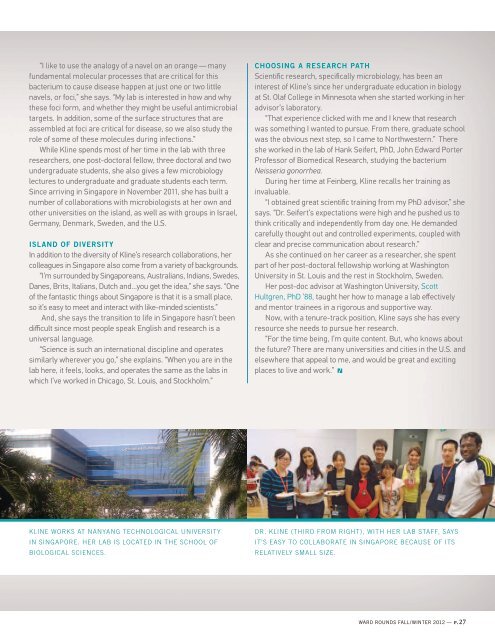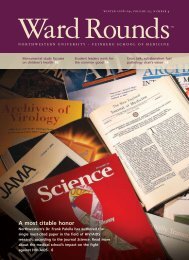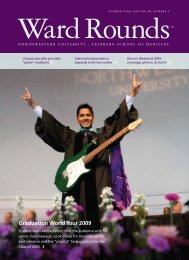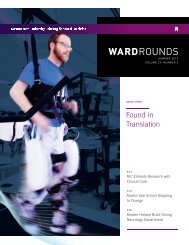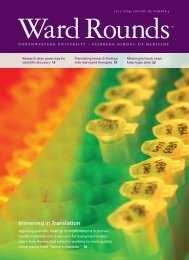Download PDF - Ward Rounds - Northwestern University
Download PDF - Ward Rounds - Northwestern University
Download PDF - Ward Rounds - Northwestern University
You also want an ePaper? Increase the reach of your titles
YUMPU automatically turns print PDFs into web optimized ePapers that Google loves.
“I like to use the analogy of a navel on an orange — many<br />
fundamental molecular processes that are critical for this<br />
bacterium to cause disease happen at just one or two little<br />
navels, or foci,” she says. “My lab is interested in how and why<br />
these foci form, and whether they might be useful antimicrobial<br />
targets. In addition, some of the surface structures that are<br />
assembled at foci are critical for disease, so we also study the<br />
role of some of these molecules during infections.”<br />
While Kline spends most of her time in the lab with three<br />
researchers, one post-doctoral fellow, three doctoral and two<br />
undergraduate students, she also gives a few microbiology<br />
lectures to undergraduate and graduate students each term.<br />
Since arriving in Singapore in November 2011, she has built a<br />
number of collaborations with microbiologists at her own and<br />
other universities on the island, as well as with groups in Israel,<br />
Germany, Denmark, Sweden, and the U.S.<br />
Island of diversity<br />
In addition to the diversity of Kline’s research collaborations, her<br />
colleagues in Singapore also come from a variety of backgrounds.<br />
“I’m surrounded by Singaporeans, Australians, Indians, Swedes,<br />
Danes, Brits, Italians, Dutch and…you get the idea,” she says. “One<br />
of the fantastic things about Singapore is that it is a small place,<br />
so it’s easy to meet and interact with like-minded scientists.”<br />
And, she says the transition to life in Singapore hasn’t been<br />
difficult since most people speak English and research is a<br />
universal language.<br />
“Science is such an international discipline and operates<br />
similarly wherever you go,” she explains. “When you are in the<br />
lab here, it feels, looks, and operates the same as the labs in<br />
which I’ve worked in Chicago, St. Louis, and Stockholm.”<br />
Choosing a research path<br />
Scientific research, specifically microbiology, has been an<br />
interest of Kline’s since her undergraduate education in biology<br />
at St. Olaf College in Minnesota when she started working in her<br />
advisor’s laboratory.<br />
“That experience clicked with me and I knew that research<br />
was something I wanted to pursue. From there, graduate school<br />
was the obvious next step, so I came to <strong>Northwestern</strong>.” There<br />
she worked in the lab of Hank Seifert, PhD, John Edward Porter<br />
Professor of Biomedical Research, studying the bacterium<br />
Neisseria gonorrhea.<br />
During her time at Feinberg, Kline recalls her training as<br />
invaluable.<br />
“I obtained great scientific training from my PhD advisor,” she<br />
says. “Dr. Seifert’s expectations were high and he pushed us to<br />
think critically and independently from day one. He demanded<br />
carefully thought out and controlled experiments, coupled with<br />
clear and precise communication about research.”<br />
As she continued on her career as a researcher, she spent<br />
part of her post-doctoral fellowship working at Washington<br />
<strong>University</strong> in St. Louis and the rest in Stockholm, Sweden.<br />
Her post-doc advisor at Washington <strong>University</strong>, Scott<br />
Hultgren, PhD ’88, taught her how to manage a lab effectively<br />
and mentor trainees in a rigorous and supportive way.<br />
Now, with a tenure-track position, Kline says she has every<br />
resource she needs to pursue her research.<br />
“For the time being, I’m quite content. But, who knows about<br />
the future? There are many universities and cities in the U.S. and<br />
elsewhere that appeal to me, and would be great and exciting<br />
places to live and work.”<br />
Kline works at Nanyang Technological <strong>University</strong><br />
in Singapore. Her lab is located in the School of<br />
Biological Sciences.<br />
Dr. Kline (third from right), with her lab staff, says<br />
it’s easy to collaborate in Singapore because of its<br />
relatively small size.<br />
ward rounds Fall/Winter 2012 — p.27


